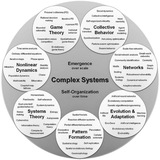group-telegram.com/ComplexSys/5808
Last Update:
Network Renormalization
The renormalization group (RG) is a powerful theoretical framework developed to consistently transform the description of configurations of systems with many degrees of freedom, along with the associated model parameters and coupling constants, across different levels of resolution. It also provides a way to identify critical points of phase transitions and study the system's behaviour around them by distinguishing between relevant and irrelevant details, the latter being unnecessary to describe the emergent macroscopic properties. In traditional physical applications, the RG largely builds on the notions of homogeneity, symmetry, geometry and locality to define metric distances, scale transformations and self-similar coarse-graining schemes. More recently, various approaches have tried to extend RG concepts to the ubiquitous realm of complex networks where explicit geometric coordinates do not necessarily exist, nodes and subgraphs can have very different properties, and homogeneous lattice-like symmetries are absent. The strong heterogeneity of real-world networks significantly complicates the definition of consistent renormalization procedures. In this review, we discuss the main attempts, the most important advances, and the remaining open challenges on the road to network renormalization.
https://arxiv.org/abs/2412.12988
BY Complex Systems Studies

Share with your friend now:
group-telegram.com/ComplexSys/5808
